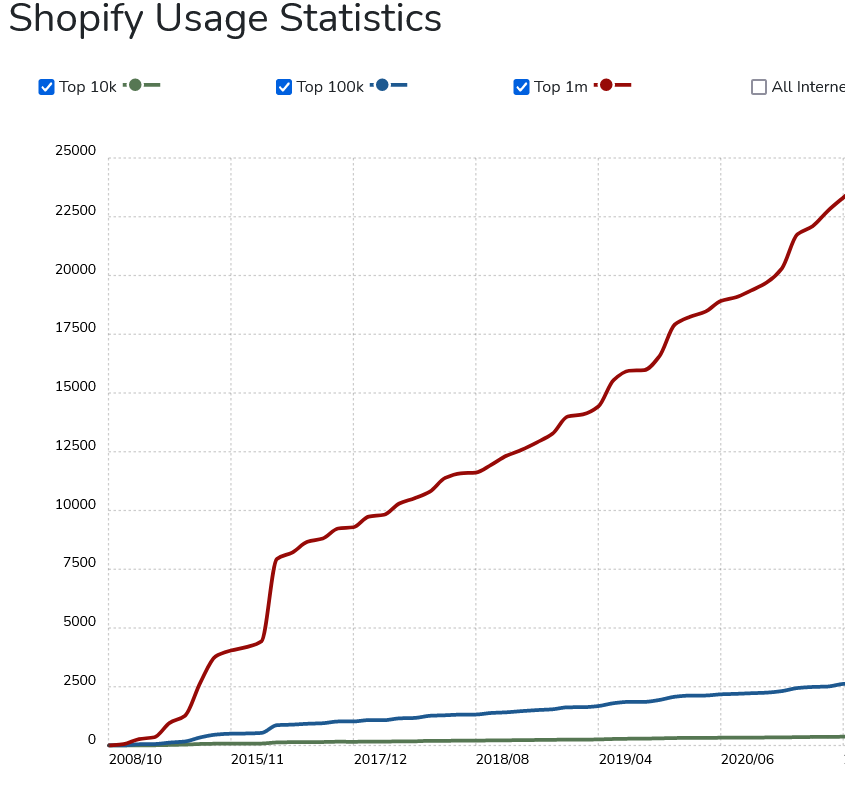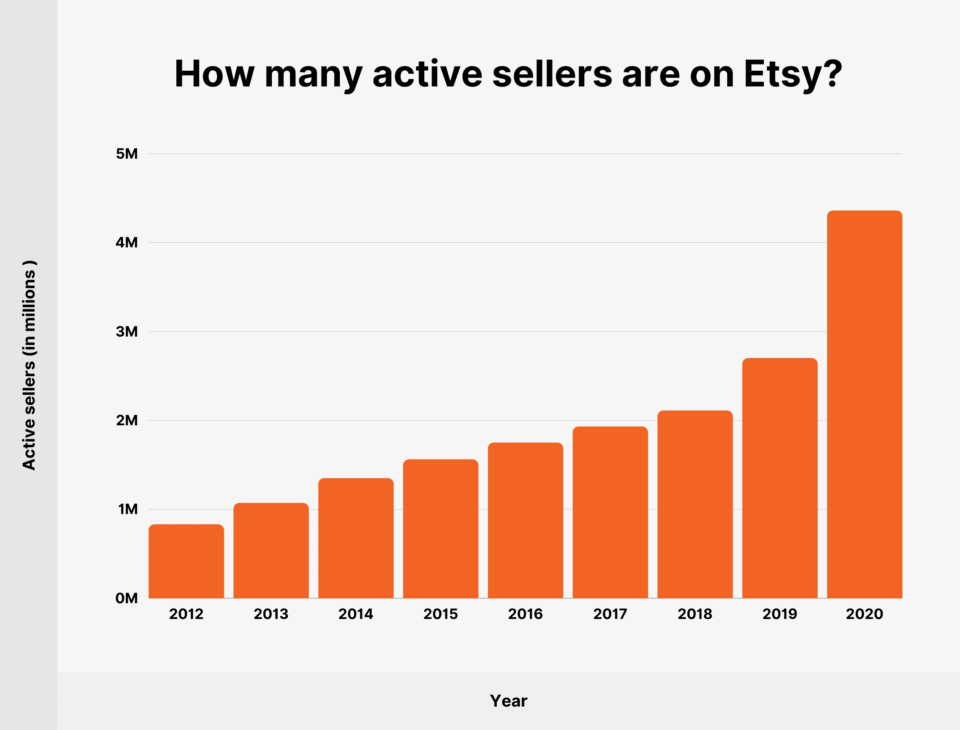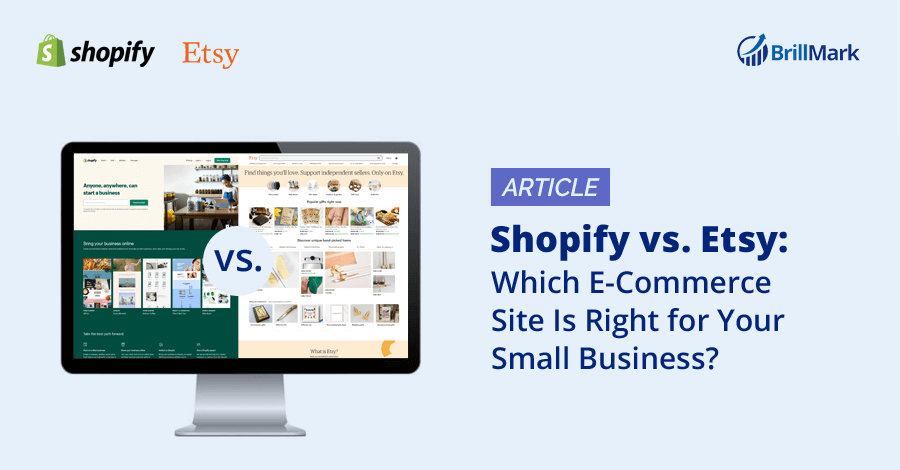If you operate a small business and want to sell online, one of the most essential things to consider is deciding on the best digital home for your items. If you’re ready to take the plunge into e-commerce sales, Shopify and Etsy are two of the best options.
It’s understandable if you’re confused — they’re both highly prominent internet selling sites. More significantly, they are a popular destination for customers to spend their money at. We’ll go through their features and pricing in detail below so you can choose the ideal one for your requirements.
In this post, we’ll help you discover and analyze your options by providing high-level information on both platforms, allowing you to select the best platform for your purposes. This post discusses each of the following categories in detail:
| Platform | Shopify | Etsy |
| Launch Date | 2006 | 2005 |
| Overview | Shopify is a platform that allows you to create your own online retail site. It includes tools to help you start and operate your business, from the layout of your shop through product delivery to customers. | Etsy is an online platform where you can list your items alongside those of other online retailers. It is intended for independent makers of handcrafted goods and crafts, as well as collectors of rare vintage things. |
| Users | 4,600,000+ | 4,300,000+ |
| Ease of Use | Easy | Easy |
| Customizability | Flexible | Some flexibility but limited |
| Domain & URL | Custom domain | No custom domain |
| E-commerce Toolkit | Shopify is packed with sophisticated tools and a huge app store for adding features to your website. | Etsy provides a good selection of features, but they are limited and straightforward. |
| Support | 24-7 | Takes time to respond |
| Pricing | Starts at $29 | Listing fee $0.20 plus other charges |
| Conclusion | Shopify is the ideal platform for small companies that want to grow their online presence. | Etsy is an online marketplace that is ideal for individual and small-scale vendors. |
Overview: Shopify vs Etsy
Shopify
The Shopify platform allows you to easily establish your own online storefront. Whichever design you choose is totally up to you. Shopify offers a plethora of options to assist you in displaying items, defining your brand, and marketing yourself. Furthermore, Shopify provides hundreds of connectors that enhance the functionality of your business and allow various applications to work together. This is useful if you already use many apps to operate your online store.
Shopify is appropriate for both large and small enterprises. Using this platform, merchants from all over the world offer thousands of items to millions of customers.
Note: For more on how to set up your own Shopify store from start to finish, read our article How to Create Your Store on Shopify?
Etsy
Etsy is an online marketplace with one storefront that contains many online sellers. All merchants have one thing in common: Their products are of the creative and crafty variety, which makes the Etsy market extremely competitive. For your customers, Etsy’s engagement in the purchasing process is front and center.
Etsy’s unique take on the ecommerce sector is that they offer products that are “handcrafted, vintage, or one-of-a-kind.” Etsy welcomes small and large independent sellers to sell on their marketplace. As a result, it’s frequently an entry-level shopfront, best suited for novice merchants with little inventory.
Users
Shopify
 Source: Builtwith.com
Source: Builtwith.com
Shopify has had a huge increase in users over the last few years. As of now, it’s used on over 4,000,000+ websites.
Etsy
 Source: Backlinko.com
Source: Backlinko.com
In 2020, Etsy reached 4,300,000+ active users. This represents a 1.98x growth over 2019, resulting in an additional 2.16 million vendors.
Ease of Use
Shopify
Shopify does not require any prior knowledge of coding or website development to get up and running. Shopify delivers the most seamless customer experience, allowing merchants to provide a fantastic user experience to their customers.
The Shopify panel is straightforward and full of valuable information: The menu in the left column divides the various sections you’ll need to access, such as orders, goods, and analytics, while other panes display total sales, customer sessions, and sales by channel.
Etsy
Etsy is simple to navigate. For instance, it is less comprehensive than Shopify. You only need to sign up and submit your items and details to get started. The Etsy user panel is comparable to Shopify’s in that it provides access to sales, product descriptions, and consumer data.
Due to the options of Etsy’s functionality, Shopify is a little more advanced. At the same time, because there aren’t many sophisticated options on Etsy, what you see is what you get. Etsy’s total setup procedure takes less time than Shopify’s.
Customizability
Shopify
Shopify is at the extreme end of the spectrum in terms of customizability and design — the possibilities are virtually limitless. You’ll have access to your website’s backend, where you can select from over 60 themes.
The first 10 are free, but the remaining 50 are paid, and they’re optimized to cover a wide range of sectors. Some of these designs even have zoom-in capabilities, which is ideal if you own a furniture or clothing business. After you’ve chosen a theme, you can customize, modify, and rearrange it to your heart’s delight.
Etsy
Etsy allows you to submit your own logo, but that is the extent of its customization. As a result, for individuals who are new to web design, this may be advantageous — because you don’t have to worry about it.
However, the majority of businesses see this as a big disadvantage because you won’t be able to stand out, market yourself, or infuse any personality into your listings. Those who have a strong picture of what their ideal shop should look like may find this challenging.
The fascinating aspect of Etsy is that you are selling on a marketplace instead of establishing your personal shop from the ground up. This implies that, on the one hand, you can’t really make any blunders with the appearance of the shop. On the other hand, there is also no way to truly distinguish your internet presence from the other merchants who are similar to you.
Domain & URL
Shopify
The Shopify shop you build will require a web address, so you’ll need to register and utilize your personal domain. This is, once again, good for creating your brand. However, this does include the added cost of paying for hosting and domain rights. With its organized web domain register procedure, Shopify makes this simple.
Etsy
Your shop will be a subdomain of the Etsy marketplace and will look somewhat like this: www.etsy.com/shop/’your-store-name’.
Etsy Pattern can help you create a website that is as distinctive as your business and grow your online sales beyond the Etsy marketplace.
This seems to be an easy method to sell without investing in your own domain for sellers who want to keep the whole process modest and uncomplicated. Maybe you’re not ready to manage your personal webpage, in which instance an online marketplace may suffice. However, if you’d like to establish a personal brand, you’ll probably want your own domain.
Ecommerce Toolkit
Shopify
Shopify, on the other hand, is well known for the range and effectiveness of its online sales capabilities. This makes it an excellent alternative for companies wanting to expand and utilize a variety of methods for selling and promoting their brand. Shopify also provides a wonderful app store where you can integrate to its already diverse toolset whatever additional features you require (keep in mind that these plugins can occasionally be expensive).
Etsy
Etsy takes pride in offering simple-to-use but powerful e-commerce solutions to help you promote and build your impact. It provides you with a basic toolbox that contains everything you could want to easily manage your Etsy business.
Etsy also has a tool that lets you generate and apply discounts so you can purchase and print reduced postage, which saves you money on shipping.
When you subscribe to Etsy Plus, you can increase your toolbox, which includes more choices for personalizing your business, discounts on promotional products, email alerts to consumers when items are restocked, advertisement credit, and offers on your own web domain.
Customer Support
Shopify
Shopify provides phone and live online chat assistance 24 hours a day, seven days a week, so if you have a problem in the middle of the night, you can call them immediately. They also provide assistance through their social media profiles, forums, and email, as well as video lessons, which are useful for resolving frequently encountered difficulties and queries.
Etsy
Etsy offers a Help Center that is well organized, and you can use the search tool to help you locate the answers you’re looking for. That’s in addition to a forum where you benefit from and participate in community conversations, as well as ask questions. You can contact Etsy’s customer service team by email or schedule a call.
Pricing
Shopify
Shopify has three plans:
- Basic Shopify is $29 a month. This is best for beginning enterprises or those transitioning from online to in-person sales.
- The standard Shopify plan is $79 per month. This is best for developing enterprises with a single retail location.
- Advanced Shopify is $299 per month and includes all of the other plans’ capabilities. It’s ideal for expanding enterprises with two or more retail locations.
Shopify also provides a 14-day free trial for businesses to get used to the Shopify platform before utilizing it fully, and you can access and use it without providing any credit card or any other financial information.
Etsy
There is no monthly price with the regular Etsy package. It does, however, require a $0.20 listing fee for each good, which will remain live for several months (or until the item is sold). Etsy also charges a 5% transaction fee and an extra 3% + $0.25 for processing payments on each item sold.
Etsy then provides three options:
- Etsy Standard. There are no additional fees other than the listing, payment, and service charges that apply to all packages.
- Etsy Plus ($10/month). This plan provides a monthly credit budget for listings and Etsy Ads, a discount for a personalized web address for your Etsy store, extensive store personalization choices, and discounts on custom packaging and marketing materials.
- Etsy Pattern ($15/month). In addition to your Etsy shop, this add-on service lets you establish an e-commerce site with your own domain name.
Conclusion
These two platforms may appear identical at first glance, but we hope that after reading this, you have a clear understanding of where they vary and where each platform excels. When picking which eCommerce platform to utilize, several considerations come into play, including your technical abilities, budget, shop size, and desired functionality, to mention only a few.
- Shopify is the best platform for small businesses looking to expand their online presence.
- Etsy is an online marketplace that is ideal for individual and small-scale vendors.
If you want the best of both worlds, don’t worry: With the Shopify App Store, you can easily integrate Etsy’s Marketplace with your Shopify Store. This real-time synchronization of orders and inventory ensures there will be no miscommunication between the two stores. You can create, build, and promote your own shop while also using the Etsy Marketplace to broaden your digital visibility and reputation with the enormous audiences Etsy has already built — it’s a win-win situation!
We hope this article has provided you with enough information to help you determine which of these e-commerce platforms is appropriate for you. In addition, if you think you might choose either of the above platforms, we have an experienced team that can set up your e-commerce profile and adjusts the themes for your online store. You can rely on our well-regarded Shopify Development Service teams to handle everything from the initial setup of an online store to its ongoing management. Because of our expertise with numerous themes and our understanding of Liquid files, we can quickly explore, identify, and address issues.
Contact us to find out more.
